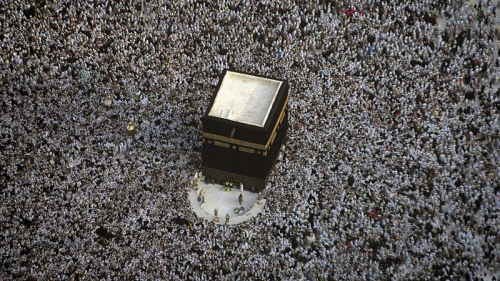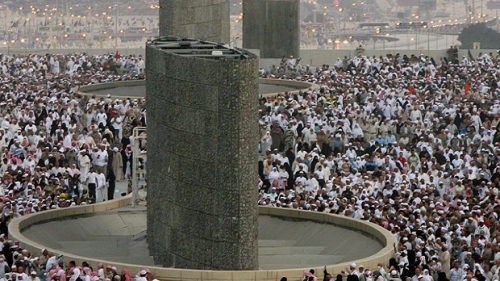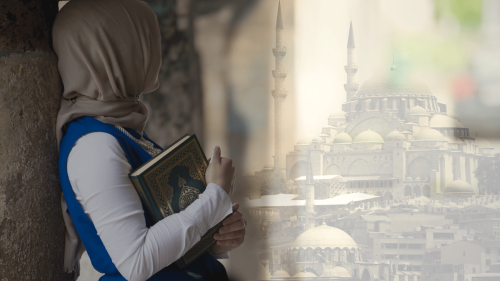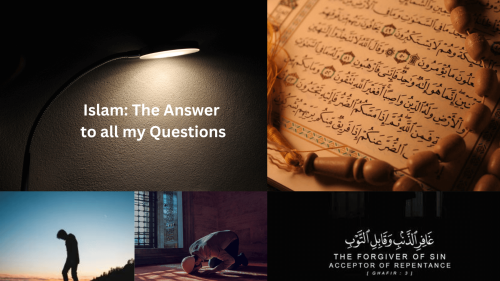Reflections on the Branches of Faith

The Love of God is the spring from which faith flows and the foundation from which our following of the example of the Prophet is born. It is narrated in an authentic tradition of the Prophet Muhammad that he said:
| "Faith is seventy-something branches. The highest of the branches is the statement 'There is no god but God' and the lowest of them is to remove something harmful from the road. Modesty is from faith." (Muslim) |
In this simple tradition the Prophet clarifies to mankind that faith requires more than lip-service. Faith is an ongoing struggle towards improvement, a journey of actualization and a mission of carrying the message of truth to all of creation.
Therefore, yes, the foundation of such faith is the core conceptualization of the oneness of the Creator and the Sustainer of the heavens and the earth, but it is also manifested in other things. That faith shows itself in the way that one pays attention to their internal states and their intentions behind their actions. It manifests itself in outward actions, such as smiling in the face of a stranger or a family member, or removing something harmful from the path.
It is out of this tradition and its profundity that Imam Al-Bayhaqi wrote his monumental work The Branches of Faith. The work is over ten volumes long and covers many different areas of Islamic thought and practice.
It is a compilation of traditions of the Prophet Muhammad as well as the righteous people who came after him. It consists of seventy-seven branches of faith and is in actuality a magnum opus for the ethical teachings of the Prophet. This is because although the first several branches deal strictly with issues of belief, many of the chapters that come thereafter deal with varying issues of social ethics and manners.
Clearly in dealing with such a work it is not possible to cover everything. Rather, we will choose certain chapters and then combine between the material in those sections as well as personal reflections in order to discuss the topic at hand.
The 10th of the Branches of Faith: Love for God
In these verses the importance of love for God is clear. This is not merely a side issue but rather something that is central...
A man came to Ibn Surayj and he asked him:
"Where do you find in the Quran that love for God is required?"
He said, "I do not know, but so-and-so says so."
The man said, "It is in His statement:
 |
| "Say, 'If your fathers, your sons, your brothers, your wives, your relatives, wealth which you have obtained, commerce wherein you fear decline, and dwellings with which you are pleased are more beloved to you than God and His Messenger and struggling in His cause, then wait until God executes His command. And God does not guide the defiantly disobedient people'' At-Tawbah 9:24 |
This is because such a threat does not come except in response to something which is required.
In another place in the Quran God says:
 |
| "And, among the people are those who take other than God as equals [to Him]. They love them as they [should] love God. But those who believe are stronger in love for God" Al-Baqarah 2:165 |
And also:
 |
| "Say, 'If you love God, then follow me [Muhammad], God will love you and forgive you your sins. And God is Forgiving and Merciful'" Al-Imran 3:31 |
In these verses the importance of love for God is clear. This is not merely a side issue but rather something that is central within the Islamic perspective on life. It is this love that is the spring from which faith flows and the foundation from which our following of the example of the Prophet is born.
The centrality of love for God is also emphasized in various traditions of the Prophet. In one of these traditions the Prophet, peace be upon him, said:
| "There are three characteristics which if a person has them, he will taste the sweetness of faith: for God and His messenger to be more beloved to them than anything else; to love another person purely for the sake of God; and to hate to return to disbelief just as they would hate to be thrown into fire" (Al-Bukhari). |
But What is Love for God?
Through these various verses and traditions it is clear that love for God is a fundamental part of faith. However, sometimes although we know something in a general way we need indicators and details in order to really understand what it actually means. This is something that takes us past mere sloganeering and into the realm of true understanding and actualization. As such the scholars mentioned several different meanings for what love for God really is. Amongst these are the following:
|
So What Should I Do?
There are two particular things that are specifically or implicitly mentioned by Imam Al-Bayhaqi that we can focus on when trying to increase our love for God. The first is to follow the example of the Prophet and the second is to be consistent in His remembrance.
The great scholar and exegete Ibn Kathir mentioned when commenting on the verse of the Quran...
 |
| "There has certainly been for you in the Messenger of God an excellent pattern for anyone whose hope is in God and the Last Day and [who] remembers God often," Al-Ahzab 33:21 |
...that this pattern is in his speech, actions, and internal states.
Many times when we think of the example of the Messenger we think of particular actions or statements, but to follow him is to do more than this. It is to also seek the internal states that accompanied those external actions and statements; concepts such as sincerity, integrity, honesty, humility, generosity, courage, forgiveness, etc. As such one of the ways that we can increase in our love for God is to increase in our love of His messenger. This can be accomplished through a deep study of his life and his characteristics, while continuously seeking to follow his practical example in our daily lives.
The other thing that we can do to increase our love for God is to engage constantly in His remembrance. Imam Al-Bayhaqi actually spends much of the chapter on this concept and mentions a large number of traditions highlighting the importance of remembering God and the merits of particular supplications and actions. Here we will mention only two, and anyone who is interesting in more detail can refer to books such as Riyad al-Salihin of al-Nawawi and The Fortress of the Muslim.
The first is a tradition wherein the Messenger said:
| "The most beloved words to God are 'O my Lord you are exalted above all imperfection and to You is all praise, blessed is Your name, exalted are You, and there is no god except You.
And the most hated words to God is for a person to say to his brother, 'Be mindful of God,' and for his brother to respond with, 'Worry about yourself.'" |
This tradition gives us a severe reminder about arrogance but it also highlights the merit of this particular phrase.
Another tradition states,
| "Two words, they are light on the tongue, heavy on the scales, and beloved to the Most Merciful: Glory and praise are to God and Glorified is God the Most Great." (Al-Bukhari & Muslim) |
Conclusion
In this [discussion] we dealt with the importance of love for God, showing some of the evidences for its obligation and discussing some of its signs. However, Al-Bayhaqi did not leave us without action items and thus we were reminded also of the importance of following the Messenger and remembering God as critical means for attaining His pleasure.
May He, the Loving, increase us in our love for Him and soften our hearts to His remembrance.
Source - OnIslam - Jamaal Diwan
The twelfth branch of faith that Imam al-Bayhaqi mentions is on having hope in Allah.
Hope in the mercy of the Creator, His blessings, bounties, and continued abundances is a cornerstone belief in Islam. It has a manifest effect upon the psychology of the Muslim and the verses and traditions on the topic are numerous.
Hope
The teaching of hope is essentially this: do whatever you can, to the best of your ability and then hope that Allah will accept it and forgive any shortcomings. In doing this, we are to have glad tidings and thereafter maintain optimism in the bountiful mercy of our Lord. This concept is clarified in several traditions. Amongst them is the following:
Prophet Muhammad said:
| "The religion is ease, and no one will make the religion difficult except that it overcomes him. So take a focused, middle path, and try your best, and have glad tidings, and seek help (from Allah) in the morning and the evening and the night." (Al-Bukhari and Muslim) |
In another incident he, told his companions:
| "If you knew what I know then you would laugh little and weep much." After doing so Allah said to him, "Why do you make My servants despair?" So the Prophet went back to them and told them, "Have glad tidings, and take a focused, middle path, and do your best." (Al-Bukhari in al-Adab al-Mufrad and Ibn Hibban) |
Along the same meaning a man named Ubayd ibn Umayr once entered upon Lady 'Aisha, may Allah be pleased with her. When she was told about his identity she said to him, "I have been told that you sit (meaning you sit to teach others) and that others sit with you." He said, "Indeed, O mother of the believers." She said, "Then stay away from boring people and causing them to despair in Allah's mercy." (A sound tradition narrated by Abd al-Razzaq)
...and Fear
These verses and traditions emphasize the importance of maintaining a balance between hope and fear
It is also important to note that whenever we talk about having hope in the mercy of Allah it is also necessary to mention the role of having fear in His punishment as well. Otherwise we fall into one of two extremes: either having so much hope in His mercy that we are not wary of disobeying Him or having so much fear in His punishment that we are paralyzed and unable to worship Him. Both of these are tricks from Satan to push us away from the middle path of balance and moderation. Based on this Abu Sulayman Al-Darani said, "If hope outweighs fear, the heart is corrupted."
There are various verses from the Quran and traditions from the Prophet which emphasize this balance.
Allah says:
 |
 |
| Call on your Lord humbly and privately - He does not like those who transgress His bounds. And do not corrupt the earth after it has been set right - call on Him fearing and hoping. The mercy of Allah is close to those who do good. (Al-A'raf 7:55-56) |
He also says:
 |
| They hope for His mercy and fear His punishment (Al-Isra' 17:57) |
And He also says:
 |
| They called upon Us out of longing and awe, and humbled themselves before Us (Al-Anbiya' 21:90) |
About this concept the Prophet said:
| "If the believer truly knew what was with Allah from punishment then not one would hope for His Paradise. And if the disbeliever truly knew what was with Allah from mercy then not one would despair of reaching His Paradise" (Muslim) |
These verses and traditions emphasize the importance of maintaining a balance between hope and fear throughout our daily lives and in our worship and obedience to the Creator. The exception to this balance would be at the end of one's life. At that moment it is a sign of the purity of one's belief that they are hopeful in the mercy of Allah and longing to meet Him.
In a beautiful tradition, Waathila ibn al-Asqa' -it seems from the context that he may have been blind, said to Hayyan ibn al-Nadr, "Take me to visit Al-Aswad bin Yazid because I heard that he has been afflicted by some pain."
Hayyaan says that he took him to visit him and when they entered they found Yazid lying in bed facing the qiblah (the direction faced in Prayer) and beginning to lose his mind from his illness. Waathila told him to get his attention so Hayyan said, "This is your brother Waathila who is here."
Upon saying this Yazid regained control of his intellect and began reaching out and feeling around with his hand. When Hayyan saw this he knew that he was reaching out for Waathila's hand so he grabbed Waathila's hand and put it into the hand of Yazid. He said commenting on this that he wanted to hold his hand because of the place that Waathila's hand had with the hand of the Messenger of Allah - perhaps indicating that he had held his hand before. Then when he took his hand he began to alternate between putting it on his chest and his head and over his mouth.
Then Waathila said, "Can you answer a question for me? What is your opinion of Allah in this state?"
He said, "Although I am occupied by my sins, I have hope in the mercy of my Lord!"
Allah said, 'O son of Adam! As long as you call upon me and have hope in Me then I will forgive you.
Upon hearing this Waathila said, "Allah is great!" And the rest of the household said it as well upon hearing Waathila. Then Waathila said, "Allah is great! I heard the Messenger of Allah say that Allah said, 'I am where My servant's opinion of me is, so let My servant think of Me as he likes.'" (Authentically narrated by Ahmad and Ibn Hibban)
It is also reported that the early generations used to like that one is reminded of his or her good deeds at the time of their death so that they would hold a good and optimistic opinion of their Lord. In a sound tradition Al-Mu`tamir says that when his father was on his deathbed he said to him, "O Mu'tamir, speak to me about the expiations and mercies of my Lord so that when I meet Him I will have a good opinion of Him."
Just Do Your Best
In modern societies the pressure to succeed is often so high that it is easy for one to constantly feel like a failure. Based on the traditions in the beginning of this section we should seek to correct this feeling and simply try our best, hoping for the mercy and forgiveness of Allah - which is the ultimate success. As such we will end this article with a couple of traditions wherein the Prophet , relates to us Allah's words about mercy. In the next article we will continue on the same topic and focus on putting our hope solely in Allah and supplicating to Him.
The Prophet said:
| "Allah said, 'O son of Adam! As long as you call upon me and have hope in Me then I will forgive you. |
O son of Adam! If you were to meet Me with sins that could fill the earth, while not associating partners with Me, then I would meet you with forgiveness that could fill the earth.
O son of Adam! If you were to commit sins until they filled the sky, then you sought my forgiveness, I would forgive you. And I would not mind.'" (A sound narration by Ahmad)
The Prophet also said:
| "Allah said, 'Whoever does a good deed, then he shall have ten rewards for it, or I may increase it even more than that. And whoever does a bad deed, then their recompense will be a sin, or I may forgive it. And whoever seeks to come nearer to Me by a hand span, I come nearer to him by an arm's length. And whoever seeks to come nearer to Me by an arm's length, I come nearer to him by more than that. And whoever comes to Me walking, I come to him rushing. And whoever comes to Me with an earth-full of sins, without associating any partners with Me, I will give him the equivalent in forgiveness'" (Muslim) |
O our Lord, envelope us in Your forgiveness and bring us closer to You.
Ameen.
Source - OnIslam - Jamaal Diwan
Topics: Iman (Faith And Belief) Values: Contentment, Hope, Love, Spirituality, Trustworthiness
Views: 8624
Related Suggestions
the topic at hand is very crucial in a muslim's life.
But there is a mistake in the arabic text of the ayat;
"Say, 'If you love God, then follow me [Muhammad], God will love you and forgive you your sins. And God is Forgiving and Merciful'" Al-Imran 3:24

















